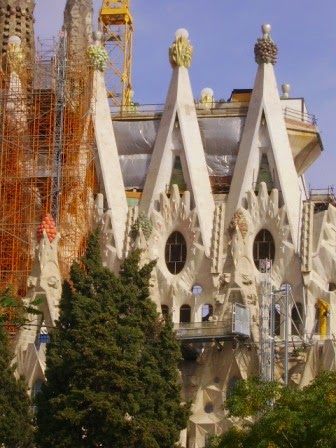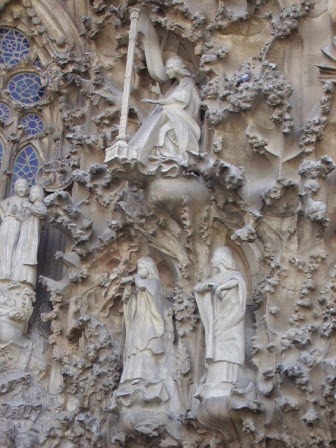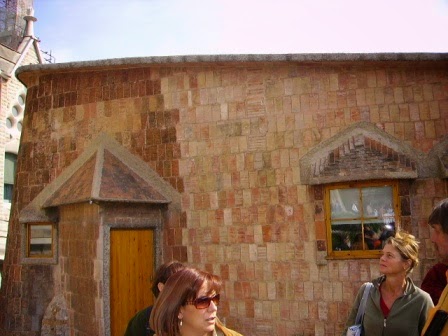Bucket List: Sagrada Familia Catholic church Barcelona, Spain
I have had the privilege of travelling to and visiting the Sagrada Familia Catholic church in Barcelona Spain, I took over 1000 photos, none can do justice as to how majestic, huge and stunningly beautiful this church actually is - this must be on your bucket list!
.jpg)
.jpg)
.jpg)
The building is just huge and you stand in complete awe!!
.jpg)
.jpg) "The BasílicaTemple Expiatori de la Sagrada Família (Basilica and Expiatory Church of the Holy Family),
is a large Roman Catholic church and it was designed by Catalan architect Antoni Gaudi (1852–1926). The church is still incomplete, but is a UNESCO World Heritage Site and in November 2010 Pope Benedict XVI consecrated
and proclaimed it a minor basilica - which is distinct from a cathedral, which must be the seat of a bishop.
"The BasílicaTemple Expiatori de la Sagrada Família (Basilica and Expiatory Church of the Holy Family),
is a large Roman Catholic church and it was designed by Catalan architect Antoni Gaudi (1852–1926). The church is still incomplete, but is a UNESCO World Heritage Site and in November 2010 Pope Benedict XVI consecrated
and proclaimed it a minor basilica - which is distinct from a cathedral, which must be the seat of a bishop..jpg) Construction
of Sagrada Família had commenced in 1882 and
Gaudí became involved in 1883, taking
over the project and transforming it with his architectural and engineering
style, combining Gothic and curvilinear Art Nouveau forms. Gaudí devoted his last years to
the project, and at the time of his death at age 73 in 1926 less than a quarter
of the project was complete. Sagrada Família's construction
progressed slowly, as it relied on private donations and was interrupted by the Spanish Civil War, only to resume intermittent progress in the 1950s. Construction
passed the midpoint in 2010 with some of the project's greatest challenges
remaining and an anticipated
completion date of 2026, the centenary of Gaudí's death.
Construction
of Sagrada Família had commenced in 1882 and
Gaudí became involved in 1883, taking
over the project and transforming it with his architectural and engineering
style, combining Gothic and curvilinear Art Nouveau forms. Gaudí devoted his last years to
the project, and at the time of his death at age 73 in 1926 less than a quarter
of the project was complete. Sagrada Família's construction
progressed slowly, as it relied on private donations and was interrupted by the Spanish Civil War, only to resume intermittent progress in the 1950s. Construction
passed the midpoint in 2010 with some of the project's greatest challenges
remaining and an anticipated
completion date of 2026, the centenary of Gaudí's death..jpg) The
basílica has a long history of dividing the citizens of Barcelona: over the
initial possibility it might compete with Barcelona's cathedral, over Gaudí's design
itself, over the possibility that
work after Gaudí's death disregarded his design, and the recent proposal to build an
underground tunnel of Spain's high speed rail link to France which could disturb its
stability.
The
basílica has a long history of dividing the citizens of Barcelona: over the
initial possibility it might compete with Barcelona's cathedral, over Gaudí's design
itself, over the possibility that
work after Gaudí's death disregarded his design, and the recent proposal to build an
underground tunnel of Spain's high speed rail link to France which could disturb its
stability..jpg)
.jpg)
.jpg)
.jpg)
.jpg)
.jpg)
.jpg)
.jpg)
.jpg)
.jpg)
.jpg)
.jpg)
.jpg)



 Once you have managed to stop taking 10 million pictures you go inside and I kept my head only too keep you head held upwards and take another 10 million pictures. I love old building and I could not stop staring and marveling at its pure art and beauty.
Once you have managed to stop taking 10 million pictures you go inside and I kept my head only too keep you head held upwards and take another 10 million pictures. I love old building and I could not stop staring and marveling at its pure art and beauty.
.jpg)
.jpg)
.jpg)
.jpg)
.jpg)
Once you have toured the church inside you will be lead into a museum and you are also privy to some of the mouldings and photographs that are many years old. Below is an extraordinary model made from baby sandbags hanging from what appear to be the ceiling - actually it is an exact model of the church suspended upside down. how awesome is that!!!
.jpg)
.jpg)
.jpg)

once outside you will come across this stunning building and a statue of St Thomas the patron saint of scholars. There is of course a gift shop with lots of over priced memorabilia.
.jpg)
.jpg) |
| Me feeling very small!! |
.jpg)
.jpg)
.jpg)
The building is just huge and you stand in complete awe!!
.jpg)
.jpg) "The BasílicaTemple Expiatori de la Sagrada Família (Basilica and Expiatory Church of the Holy Family),
is a large Roman Catholic church and it was designed by Catalan architect Antoni Gaudi (1852–1926). The church is still incomplete, but is a UNESCO World Heritage Site and in November 2010 Pope Benedict XVI consecrated
and proclaimed it a minor basilica - which is distinct from a cathedral, which must be the seat of a bishop.
"The BasílicaTemple Expiatori de la Sagrada Família (Basilica and Expiatory Church of the Holy Family),
is a large Roman Catholic church and it was designed by Catalan architect Antoni Gaudi (1852–1926). The church is still incomplete, but is a UNESCO World Heritage Site and in November 2010 Pope Benedict XVI consecrated
and proclaimed it a minor basilica - which is distinct from a cathedral, which must be the seat of a bishop..jpg) Construction
of Sagrada Família had commenced in 1882 and
Gaudí became involved in 1883, taking
over the project and transforming it with his architectural and engineering
style, combining Gothic and curvilinear Art Nouveau forms. Gaudí devoted his last years to
the project, and at the time of his death at age 73 in 1926 less than a quarter
of the project was complete. Sagrada Família's construction
progressed slowly, as it relied on private donations and was interrupted by the Spanish Civil War, only to resume intermittent progress in the 1950s. Construction
passed the midpoint in 2010 with some of the project's greatest challenges
remaining and an anticipated
completion date of 2026, the centenary of Gaudí's death.
Construction
of Sagrada Família had commenced in 1882 and
Gaudí became involved in 1883, taking
over the project and transforming it with his architectural and engineering
style, combining Gothic and curvilinear Art Nouveau forms. Gaudí devoted his last years to
the project, and at the time of his death at age 73 in 1926 less than a quarter
of the project was complete. Sagrada Família's construction
progressed slowly, as it relied on private donations and was interrupted by the Spanish Civil War, only to resume intermittent progress in the 1950s. Construction
passed the midpoint in 2010 with some of the project's greatest challenges
remaining and an anticipated
completion date of 2026, the centenary of Gaudí's death..jpg) The
basílica has a long history of dividing the citizens of Barcelona: over the
initial possibility it might compete with Barcelona's cathedral, over Gaudí's design
itself, over the possibility that
work after Gaudí's death disregarded his design, and the recent proposal to build an
underground tunnel of Spain's high speed rail link to France which could disturb its
stability.
The
basílica has a long history of dividing the citizens of Barcelona: over the
initial possibility it might compete with Barcelona's cathedral, over Gaudí's design
itself, over the possibility that
work after Gaudí's death disregarded his design, and the recent proposal to build an
underground tunnel of Spain's high speed rail link to France which could disturb its
stability.
Describing Sagrada Família, art critic Rainer
Zerbst said, "It is probably impossible to find a church building anything
like it in the entire history of art" and Paul Goldberger called it,
"The most extraordinary personal interpretation of Gothic architecture
since the Middle Ages". "
.jpg)
.jpg)
.jpg)
.jpg)
.jpg)
.jpg)
.jpg) |
| me awestruck !!! |
.jpg)
.jpg)
.jpg)
.jpg)
.jpg)
.jpg)
.jpg)



 Once you have managed to stop taking 10 million pictures you go inside and I kept my head only too keep you head held upwards and take another 10 million pictures. I love old building and I could not stop staring and marveling at its pure art and beauty.
Once you have managed to stop taking 10 million pictures you go inside and I kept my head only too keep you head held upwards and take another 10 million pictures. I love old building and I could not stop staring and marveling at its pure art and beauty..jpg)
.jpg)
.jpg)
.jpg)
.jpg)
The roof and ceilings are out of this world and the stain glass windows well a Wow is all that is needed.!!
Once you have toured the church inside you will be lead into a museum and you are also privy to some of the mouldings and photographs that are many years old. Below is an extraordinary model made from baby sandbags hanging from what appear to be the ceiling - actually it is an exact model of the church suspended upside down. how awesome is that!!!
.jpg)
.jpg)
.jpg)

once outside you will come across this stunning building and a statue of St Thomas the patron saint of scholars. There is of course a gift shop with lots of over priced memorabilia.
.jpg)
Bit more history:
"EXPIATORY CHURCH
The expiatory church of La Sagrada
Família is a work on a grand scale which was begun on 19 March 1882 from a
project by the diocesan architect Francisco de Paula del Villar (1828-1901). At
the end of 1883 Gaudí was commissioned to carry on the works, a task which he
did not abandon until his death in 1926. Since then different architects have
continued the work after his original idea.
The building is in the centre of Barcelona, and over the years it has become one of the most universal signs of identity of the city and the country. It is visited by millions of people every year and many more study its architectural and religious content.
It has always been an expiatory church, which means that since the outset, 132 years ago now, it has been built from donations. Gaudí himself said: "The expiatory church of La Sagrada Família is made by the people and is mirrored in them. It is a work that is in the hands of God and the will of the people." The building is still going on and could be finished some time in the first third of the 21st century.
The building is in the centre of Barcelona, and over the years it has become one of the most universal signs of identity of the city and the country. It is visited by millions of people every year and many more study its architectural and religious content.
It has always been an expiatory church, which means that since the outset, 132 years ago now, it has been built from donations. Gaudí himself said: "The expiatory church of La Sagrada Família is made by the people and is mirrored in them. It is a work that is in the hands of God and the will of the people." The building is still going on and could be finished some time in the first third of the 21st century.
LA SAGRADA FAMÍLIA
"Gaudí spent most
of his professional career building the Expiatory Church of La Sagrada
Família, He received the commission in late 1883 and it occupied the his
whole life. He did other work there, such as the Provisional Schools of La
Sagrada Família (1909), and the construction of the workshop, where he worked
with models and photographs, and where for his final years he went to live to
follow the work from closer up. Walter Gropius came to the church in 1907, but
did not manage to talk to Gaudí, "who was working busily".
In 1910 Güell promoted an exhibition of Gaudí's work at Le Grand Palais in Paris, It had a certain international echo, which reached as far as the United States and introduced him to the architect Sullivan (Chicago School).
A few years later, in 1922, the Congress of Spanish Architects was held in Barcelona and supported his work. The same year he received a commission to do a project for a church for Our Lady of Rancagua, in Chile, for which he proposed to build the chapel of the Assumption in the apse.
In 1923-1924 the architects Neufert and Linder, on the advice of Walter Gropius, visited Gaudí. They made friends with him and published an important article in the journal Deutsche Bauzeitung." "
In 1910 Güell promoted an exhibition of Gaudí's work at Le Grand Palais in Paris, It had a certain international echo, which reached as far as the United States and introduced him to the architect Sullivan (Chicago School).
A few years later, in 1922, the Congress of Spanish Architects was held in Barcelona and supported his work. The same year he received a commission to do a project for a church for Our Lady of Rancagua, in Chile, for which he proposed to build the chapel of the Assumption in the apse.
In 1923-1924 the architects Neufert and Linder, on the advice of Walter Gropius, visited Gaudí. They made friends with him and published an important article in the journal Deutsche Bauzeitung." "
.jpg)
.jpg)
.jpg)
.jpg)
.jpg)
.jpg)
.jpg)
.jpg)

.jpg)








.jpg)
.jpg)
.jpg)



